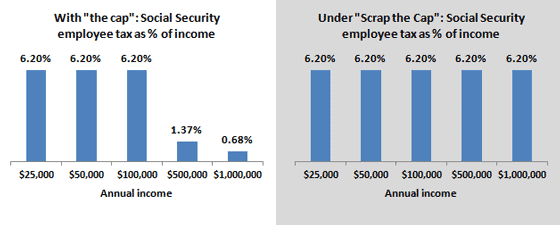 One change could eliminate the long-term shortfall, promote tax equity and allow a modest benefit increase now
One change could eliminate the long-term shortfall, promote tax equity and allow a modest benefit increase now
The 2012 Social Security Trustees’ Report shows the nation’s most important and popular social insurance system is on sound financial footing for at least another generation. With $2.7 trillion in its trust fund, Social Security can pay full benefits through 2033.
After 2033, the program can still pay 75% of benefits, even with no action by Congress. And because of how Social Security calculates benefits, that “75%” of benefits in 2033 will be about the same (in inflation-adjusted dollars) as benefits today.
But America can do better than that. Under the “Scrap the Cap” plan, Social Security can pay 100% of benefits after 2033, and even modestly expand benefits today, if Congress makes one simple change: eliminate Social Security’s cap on taxable income (now set at $110,100) so high income earners pay the same tax rate as middle class workers.

Eliminating Social Security’s cap on taxable income (now set at $110,100) means
high income earners would pay the same tax rate as middle class workers
The additional funding could boost benefits for low-income earners, add credits for individuals (often women) who take time from work to raise their family, and restore benefits for college students that were cut in the 1980’s.
“These improvements immediately boost the American economy, build economic security for women, and safeguard educational opportunities for young people who have suffered the loss of a parent,” according to Marilyn Watkins, policy director for the Economic Opportunity Institute.
Social Security benefits are more critical to American economic security than ever. According to estimates, nearly one-half of Americans will be unable to maintain their standard of living in old age. About 1 in 4 Washington households – more than 1 million Washingtonians, including 73,000 children – received old age, survivor, or disability benefits from Social Security in December 2010.
More To Read
November 1, 2024
Accessible, affordable health care must be protected
Washington’s elected leaders can further expand essential health care
September 24, 2024
Oregon and Washington: Different Tax Codes and Very Different Ballot Fights about Taxes this November
Structural differences in Oregon and Washington’s tax codes create the backdrop for very different conversations about taxes and fairness this fall
September 10, 2024
Big Corporations Merge. Patients Pay The Bill
An old story with predictable results.
